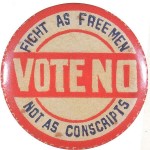A Thought Experiment about Patents and Taxes
IP LawIn Reducing the Cost of IP Law, I argued that one improvement to the patent system (short of abolition) would be to eliminate injunctions and provie for a compulsory licensing system. As I noted there, the compulsory licensing approach is not new. Some countries impose compulsory licensing on patentees who do not adequately “work” the patent. I discussed provisions in US patent law that do permit compulsory licenses already in some situations.1 I was reminded of this when discussing with some friends a comment to this blogpost, Pirated Software Could Bring Down Predator Drones. The commentor stated: “Just declare the IP a state secret. The market value is then zero, as the company cant sell it legally. Buy it from the company for 1 cent. Then classify the contract as top secret. If the company complains, send the people to jail or gitmo.”
As I noted in the previous posts, the feds have the authority to license third parties to manufacture patented articles, without patent infringement liability; this was threatened in the Cipro anthrax drug a couple years ago. The feds then have to pay “compensation” to the patent holder. Something similar happens if the some federal agency issues a “secrecy order” for military or other reasons for a pending patent.2
It occurs to me that the very notion of a compulsory license for IP can help to illustrate how IP is an obvious transfer of wealth. Consider: under current law, the state grants a patent monopoly to some applicant. Then, the state can declare a compulsory monopoly (or issue a secrecy order), and pay you some compensation for this “taking”. Obviously this payment comes from tax payers. So the IP step can be seen as just an intermediate step to justify transferring money from everyone else to the patentee. It’s as if you tell the state you have an idea and the state takes money from others and gives it to you. Come to think of it, this is exactly the idea behind proposals for tax-funded “innovation” awards–proposed even by some libertarians (!).3 The point is that even when the state does not issue the compulsory license, they are simply deputizing the patentee to go out and extort the money himself; it’s like taxation.
(Incidentally, in An Objectivist IP Argument for Taxation, I provide another argument for why IP could be used to justify taxes.)
See Ciprofloxacin: the Dispute over Compulsory Licenses; Tom Jacobs, Bayer, U.S. Deal on Anthrax Drug, Motley Fool (Oct. 25, 2001); Compulsory Licensing in the US. See also Kinsella, Brazil and Compulsory Licenses, Mises Blog (June 8, 2007); Kinsella, Condemning Patents, Mises Blog (Feb. 27, 2005). ↩
See The Secrecy Order Program in the United States Patent & Trademark Office; 35 USC ch. 17 §§ 181, 183. ↩
See my posts Libertarian Favors $80 Billion Annual Tax-Funded “Medical Innovation Prize Fund”; “$30 Billion Taxfunded Innovation Contracts: The ‘Progressive-Libertarian’ Solution“; “Re: Patents and Utilitarian Thinking Redux: Stiglitz on using Prizes to Stimulate Innovation.” ↩
A Thought Experiment about Patents and Taxes Read Post »

